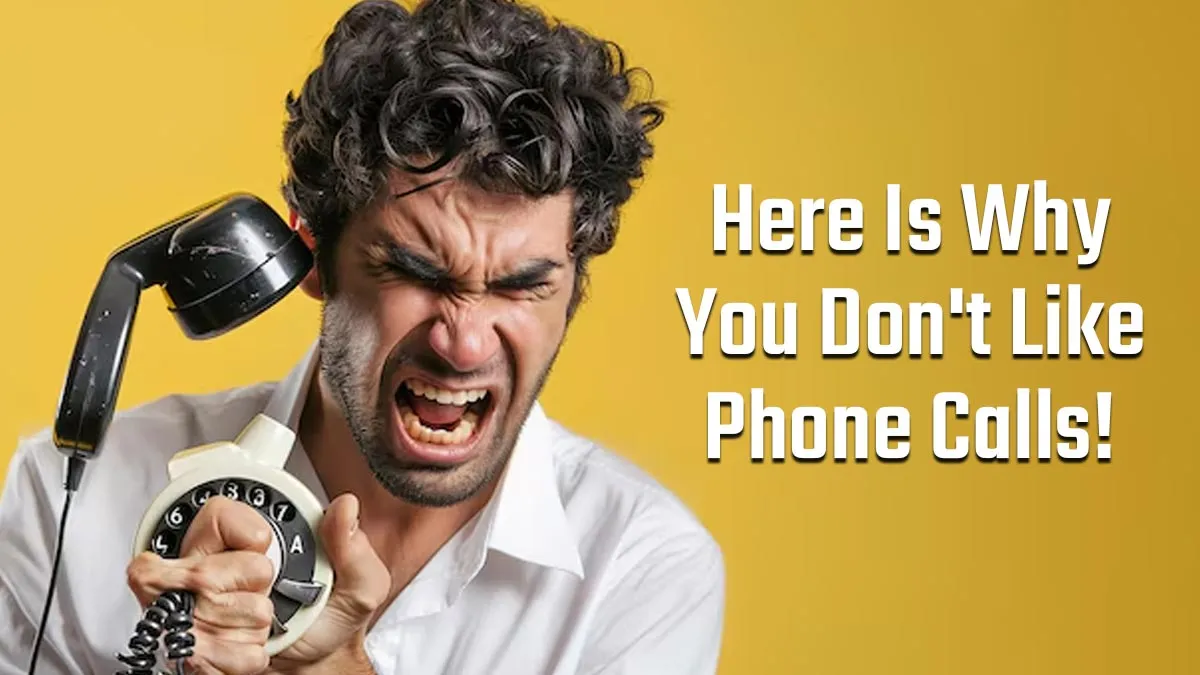
In today’s hyper-connected world, phones are an essential part of our daily lives. However, for some people, the mere thought of answering a call can trigger intense anxiety. This condition, known as telephobia or phone anxiety, affects millions worldwide, making it difficult to engage in phone conversations despite the need to stay connected.
Table of Content:-
CHECK YOUR
MENTAL HEALTH

Regarding the same, we reached out to an expert, who shared how telephobia can stem from social anxiety, fear of judgment, or past negative experiences. If you find yourself avoiding calls, feeling overwhelmed, or experiencing physical symptoms like sweating or a racing heart, you might be dealing with telephobia.
What is Telephobia?

Imagine this scenario where you keep staring at the ringing phone and your mind keeps debating whether to answer or not. This hesitation that we often face isn’t random-it’s deeper than you think. Shaikh Uzma Jamal, Emotional Fitness Coach, Founder - Educate To Elevate, Lucknow, explains telephobia is not just a habit of avoiding verbal communication but it’s about internal resistance- a mix of fear, judgement, lack of control, or social anxiety.
Causes of Telephobia
Knowledge about telephobia origins serves as the base for taking control of the condition. The following factors commonly cause such fear to develop:
- Social Anxiety: Many individuals with telephobia also struggle with social anxiety. The absence of visual indicators in phone conversations requires you to struggle with interpreting another person's meaning and this causes both exaggerated analysis and increased stress.
- People feel overwhelming pressure when they need to reply correctly under time constraints. People usually hesitate to speak over the phone because they worry about misstepping and getting criticised for their vocal tones and their speaking abilities.
- Treating any negative phone interaction negatively affects future phone conversations as it causes anxiety about contacting others.
- The absence of face-to-face contact makes phone conversations seem unstable to users. Due to uncertainties about who will call and what the topic of discussion will be anxiety levels tend to increase.
ALSO READ: Why Do Notification Bells Make Us Feel Anxious? We Asked An Expert
Signs and Symptoms of Telephobia
Telephobia manifests differently in individuals, but common signs include:
- Avoiding phone calls altogether.
- Feeling anxious or panicked when the phone rings.
- Physical symptoms like sweating, trembling, or a racing heart.
- Overthinking or rehearsing conversations before making a call.
- Preferring text or email over phone communication.
If these symptoms sound familiar, you’re not alone. The key is to recognize the issue and take steps to address it.
Tips to Manage Telephobia
-1740134770171.jpg)
“Our brain perceives phone calls as something unpredictable and hence triggers a fight-flight reaction,” she explained. The expert suggested a few ways that help the people going through it.
- To break this resistance the expert recommends starting with small wins- answering low-stake calls first (a food delivery, a trusted friend).
- Mindful breathing before picking up reduces anxiety, and preparing key points helps ease uncertainty.
- Another powerful NLP-based shift- reframe thoughts- instead of fearing awkwardness, tell yourself: "This is just a conversation, not a performance."
- Remember it is not a life and death situation and that is exactly what you need to make your brain believe.
- Instead of viewing phone calls as a source of stress, reframe them as an opportunity to connect or solve a problem.
- If possible, use video calls as a stepping stone. Seeing the other person’s facial expressions can make the interaction feel more natural and less intimidating.
ALSO READ: Who Are Energy Vampires? Expert Shares The Truth About People Who Drain Your Energy
Conclusion
Telephobia represents a widespread problem which many people ignore until it prevents them from reaching their personal and career development goals. Seek advice from a therapist when phone-related issues affect your daily life to a major extent. Cognitive-behavioural therapy (CBT) functions exceedingly well as a therapeutic approach for treating phobias and anxiety disorders. When you receive favourable positive feedback your confidence builds up which motivates you to advance further. You can take control of telephone communication and decrease your anxiety level through practical methods and cause identification.
Also watch this video
How we keep this article up to date:
We work with experts and keep a close eye on the latest in health and wellness. Whenever there is a new research or helpful information, we update our articles with accurate and useful advice.
Current Version